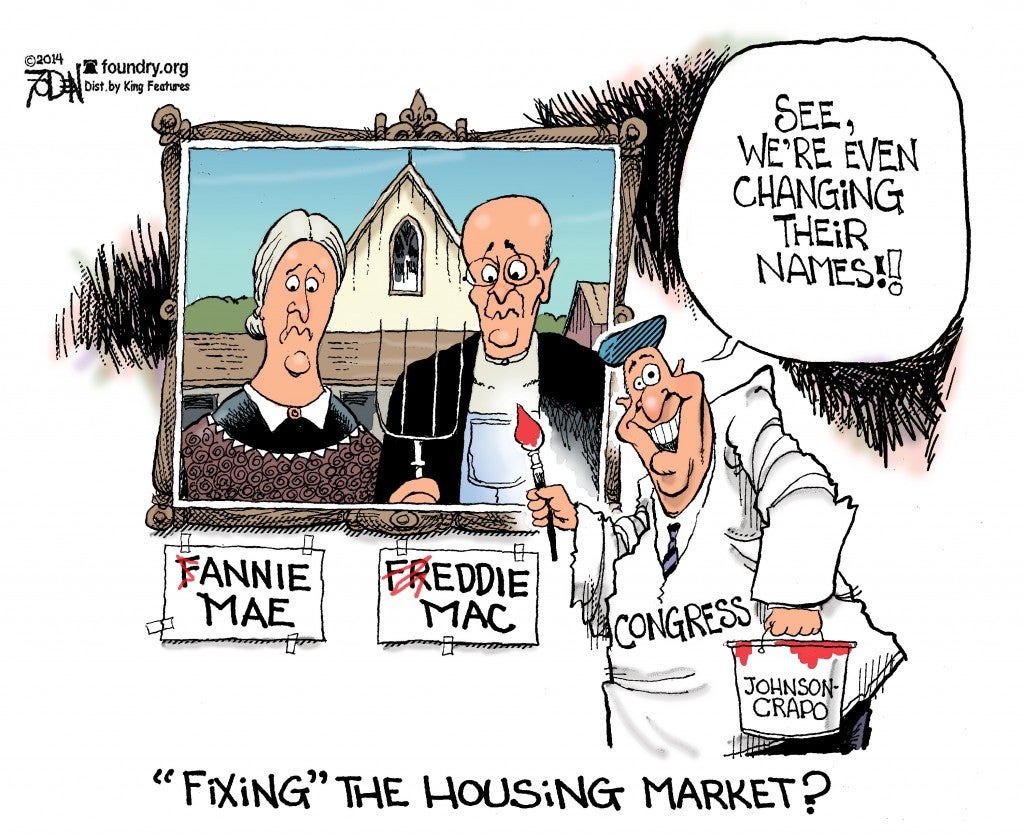Obamacare is wreaking havoc on the economy; entitlement spending is swallowing the federal budget; America’s military readiness is in shambles; and a handful of senators are working hard to make sure the government stays in the housing finance business.
Priorities, right?
Fannie Mae and Freddie Mac, the giant government-sponsored entities (GSEs) that dominate the American housing market, were supposed to help people get homes and stabilize the market. They have failed at these goals. Now, some members of Congress are claiming they want to reform the system—but they’re basically just trying to rename it.
Right now, Sens. Tim Johnson (D-S.D.) and Mike Crapo (R-Idaho) are trying to gain a few more votes to propel their not-really-reforming bill to the Senate floor.
Heritage experts Norbert Michel and John Ligon have analyzed this and other Senate proposals, and they warn that these “bills would not help people buy homes; they would only protect investors and special interests at taxpayers’ expense.”
Meanwhile, the politicking behind the scenes is fierce. Sen. Sherrod Brown (D-Ohio) told The New York Times that his fellow senators had better steer clear of one man: “If they’re thinking of Jeb Hensarling and his no-government role while we negotiate this, nothing happens.”
A “no-government role”? Sounds like a great idea. Naturally, Senate liberals aren’t too interested.
Rep. Jeb Hensarling (R-Texas) is sponsoring the PATH Act, a very different approach in the House that would get the government out of housing finance. He calls the current system of government intrusion in the housing market “unsustainable, unconscionable, and unfair.”
Hensarling told The Foundry that it doesn’t make sense to continue government-sponsored entities like Fannie Mae and Freddie Mac—which “represent the single largest bailout in America’s history, almost $200 billion coming out of the pockets of working men and women in America.”
>>> Watch Rep. Hensarling make his case
It’s uncertain whether the Johnson-Crapo proposal will make it to the Senate floor for a full vote this year; committee votes in the next week or so could determine its fate. But when it comes to housing finance, this is one area where the government needs to get out and move on.
Heritage experts have concluded:
The federal housing policies related to the GSEs have proved costly not only to the federal taxpayer, but also to financial markets and the overall economy. It is time federal policymakers accept that this institutional model has failed and that they should move toward a U.S. mortgage market without Fannie Mae and Freddie Mac.
After all, we can think of a few other things our senators could do.
What would you like to see the Senate focus on? Let us know in the comments.
Read the Morning Bell and more en español every day at Heritage Libertad.
Quick Hits:
- Do you think global poverty is on the rise—or the decline?
- Who is at the center of this Benghazi controversy?
- See how much are unions spending in the 2014 election cycle so far.
- What were investigative reporters doing in California last weekend?
- Heritage President Jim DeMint talks about the difficult but important task of making—and watching—a movie about this killer.



























